 |
 |
 |
|
||
 |
 |
 |
|
||
The Calling-on Song
| Many sword-dances
of Northern England are preceeded by what is termed a Calling-on
song, which is sung unacompanied. The song used
by Bristol Rapper is based on the one from the village of
Earsdon. In the song, the dancers are
introduced as being the "sons" of famous
military men, namely: the sons of (1) Lord
Heathfield Elliot, (2) Admiral Lord
Duncan, (3) Admiral Lord Nelson,
(4) the Duke of Wellington and (5) Napoleon
Bonaparte respectively. Surprisingly, only one
the above was actually English, namely Nelson (born in
Norfolk). The Duke of Wellington is thought of as being
English, but he was born in Dublin, Ireland. Elliot and
Duncan were both Scottish. Napoleon was of course French,
and the arch-enemy of Britain as well! For the technically-minded, the tune is in the Mixolydian Mode; unlike the modern major and minor keys (where the semitone intervals occur between the third/fourth and seventh/eighth notes), in the Mixolydian mode the semitone intervals occur between the third/fourth and sixth/seventh notes: |
| Although
interesting, the song is rather long and chant-like, and
probably not suitable for performance to most modern
audiences. However, Grant Glanville (the
captain of Bristol Rapper) always likes to sing it if he
gets the chance (although we usually try to dissuade
him!) As a compromise, he will sometimes just sing the
first, second and last verses - or just the first and
last verses. The verses of the version of the calling-on song (as performed by Grant) appear below: |
Verse 1. - The sword-dance "side" is introduced ...
| Good people, give ear to my story, |
| We have called in to see you by chance; |
| Five heroes I've brought, blithe and bonny, |
| Intending to give you a dance. |
| For Bristol is our habitation, |
| It's the place we were all born and bred; |
| There are no finer lads in the nation, |
| And there's none are more gallantly led! |
Verse 2. - Pretence of "no charge" for the forthcoming entertainment...
| 'Tis not for your gold nor your silver, |
| Nor yet for the gain of your gear; |
| But we come just to take a night's pleasure, |
| To welcome the incoming year. |
| My lads, they are all fit for action, |
| With courage and spirits so bold; |
| They are born of a noble extraction, |
| Their fathers were all heroes of old! |
Verse 3. - The First sword-dancer is introduced ...
| Now this is the son of brave Elliot, | 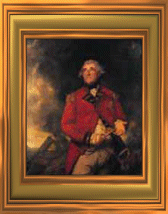 |
| The first youth to enter the ring; | |
| So proudly rejoice I to tell it, | |
| That he fought for his country and King. | |
| When the Spaniards besiegèd Gibraltar, | |
| Brave Elliot defended that place; | |
| And he soon caused their plans for to alter, | |
| Some died, others fled in disgrace! | |
| Lord Heathfield Elliot (1717-1790) |
Verse 4. - The Second sword-dancer is introduced ...
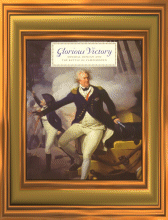 |
Now the next handsome youth that does enter, |
| Is a boy there are very few such; | |
| His father beat that great de Winter, | |
| And defeated the fleet of the Dutch. | |
| His father was that great Lord Duncan, | |
| And he played the Dutch ne'er such a prank; | |
| They fled out of their harbours, ran funkin', | |
| And fled off to that great Dogger Bank! | |
| Admiral Lord Duncan (1731-1804) |
Verse 5. - The Third sword-dancer is introduced ...
| Now this is the son of Lord Nelson, | 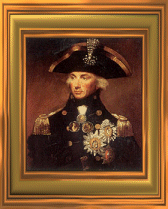 |
| The hero who fought at the Nile; | |
| Few men of such courage and talent, | |
| The Frenchmen he did them beguile. | |
| The Frenchmen they nearly decoyed him, | |
| But he managed the battle so well; | |
| In their fortress he totally destroyed them, | |
| And scarce one got off home for to tell! | |
| Admiral Lord Nelson (1758-1805) |
Verse 6. - The Fourth sword-dancer is introduced ...
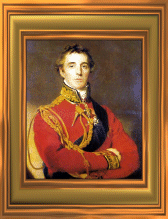 |
The next handsome youth that does enter, |
| Is a boy of ability bright; | |
| Five thousand gold guineas I'd venture, | |
| That he like his father would fight. | |
| At Waterloo and Tarryvarry, | |
| Lord Wellington made the French fly; | |
| You scarcely could find such another, | |
| He'd conquer or else he would die. | |
| The Duke of Wellington (1769-1852) |
Verse 7. - The Fifth sword-dancer is introduced ...
| And the last handsome youth that does enter, | 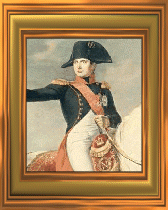 |
| Is a boy who is both straight and tall; | |
| He is the son of the great Bonaparte, | |
| The hero who conquered them all. | |
| He flew over the Lowlands like thunder, | |
| Made the nations to quiver and quake. | |
| Many thousands stood gazing in wonder, | |
| At the havoc he always did make. | |
| Napoleon Bonaparte (1769-1821) |
Verse 8. - The Summing-up, (after which, the dance begins) ...
| Now you've seen all my five noble heroes, |
| My five noble heroes by birth; |
| And each has as good a character, |
| As any such heroes on earth. |
| And if they be as good as their fathers, |
| Then their deeds are deserving re-cords; |
| Now 'tis all the whole company desires, |
| To see how they handle their swords! |
| This page (updated | 15 May 2005) | has been visited | times since 12th May 2005 |
![]()